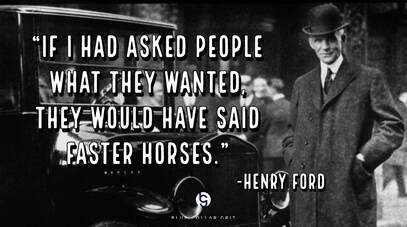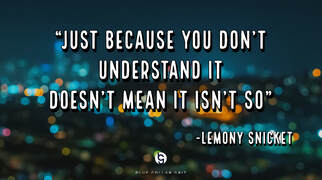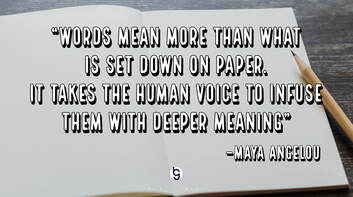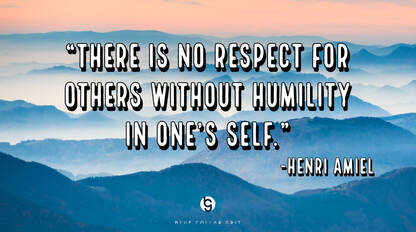Seeing Is Not BelievingThe season of Santa brings us all a little closer to our inner-child. We love to perpetuate the silly belief of a man dressed in red, flying around the world delivering presents on a sleigh powered by super-natural reindeer. Seems just a little far-fetched, right? Of course it does. And, that’s perfectly fine. It’s actually better than fine, it’s exactly how it should be. See, kids don’t need to see it to believe it. They just believe, site unseen. Sure they get pictures, stories, and a random glimpse at a department store to preserve the idea but in large part they believe for one simple reason: they want to believe. Why Should We Care? The whole ‘see it to believe’ mindset sets us up for failure in two directions. First of all, the work. If we wait until we can see it before we start working, we’re never going to grasp our full potential. Excellent performers in any field are not waiting to see concrete results before they decide to invest. It’s quite the opposite. They invest in the work in full belief that results will follow. People love to put in the extra work when they see an opportunity in front of them - a big game, a presentation, a potential promotion or move into the starting lineup. We see it all the time: “Big game, let me get some extra work in.” It’s too late now. The work for a big game was done months, if not years ago. We should have been working like it was in front of us then, not now. We waited to see it when we should’ve just believed it. Second, the potential. Henry Ford believed it before it was here. So did Thomas Edison, George Washington Carver, and Marie Curie. The vision in their mind was clear only to them. It was their belief that drove them. Not only did these revolutionary minds not see it, they were completely surrounded by people that had never seen anything like what they believed in. It was literally impossible for anyone to have seen it. Our journey is not that far removed. Our life is unique from anyone else’s. No one knows our potential. If we choose to wait to see before we believe, it’s likely we’ll never know our potential either. In reflection, understanding we had failed to even approach our potential must be one of the most demoralizing realization there could be. Living backwards, seeing to prepare rather than preparing to see, is as damaging to the trajectory of our life as any choice we make. REAL TALK - Action Steps As is usually the case, kids have it right - before we adults screw them up by speaking reality to them. Reality is such a drab place to live. Here are a few ideas on maintaining belief without proof.
We don’t need to see it to believe it. We must believe it in order to ever see it. For more information on building excellence in your teams, visit us at www.bluecollargrit.com. We would love to know how we could help!
1 Comment
If You Say SoThe words we choose are important. Not only the ones we say but also the ones that go unsaid. Regardless of whether we choose to release our thoughts into the world, the moment we think it, we release it to our world.
Everything is what you say it is. For you, that is an undeniable truth. There is no way of avoiding it. The way you choose to see the world is your reality, your truth. And that reality is ultimately nothing more than a reflection of your attitude towards all the occurrences in your life. In the abstract this can be difficult to fully embrace, so let’s get more specific and focus on one area in which our perception creates a very real reality: hard work. Why Should We Care? I have not met too many people that do not want to be considered a hard worker. Most people will quickly concede the importance of working hard as part of being any form of success or excellence. It’s a given, right? But, what is hard work? Is it an extra five hours a week? Five more reps in the weightroom? Working through lunch every day? The answer to these questions is clearly … yea, maybe. See, it matters less about what it is and more about what you say it is. If you believe you are “out here grinding”, for example, you will likely begin to do and experience things that you think people that ‘grind’ do. Such as having an increased confidence, spending more time at work, and associating yourself with other hard workers. While this sounds like a good thing, with a little observation you realize that everyone’s idea of hard work is drastically different. What is considered hard work to one person is moderate to the next. This gap can sometimes be significant. The results will eventually reflect the difference. There is a fairly simple solution to this one however - eliminate the idea of hard work. It’s all just work. Part of the process necessary to become great or reach your goals. It’s not hard work, it’s just what you need to do. Stop buying into the whole ‘grinding’ nonsense. Those striving for excellence never view it like that. There is a threshold for work. It’s neither hard nor easy. It’s just work. It’s not considered ‘grinding’. It’s just doing what is necessary. REAL TALK - Action Steps Understanding that everything is what you say it is, goes both ways. It can lift you up or pull you down depending on your personal standards. While being too high is a risk, I find that holding too low of a standard is the larger risk. Here are a few ways other than work that we see the limits at work.
Everything is what you say it is. Good or bad, right or wrong, it is what you say it is - to you anyway. One of the biggest challenges of leadership is realizing that this axiom is true for others too. Leading them will require us to understand what they say it is. For more information on building excellence in your teams, visit us at www.bluecollargrit.com. We would love to know how we could help! I Can Lose With YouTalent is a great thing. It’s obviously necessary in order to perform at a high level in any field. We train, work, and practice all in an effort to maximize the talent we’ve been given. As any coach will tell you, the Jimmies and Joes do matter.
In sports the effort to attract, recruit, and develop the best talent is never ending. This can be said for the corporate world as well. Our team is never talented to the point that we are no longer trying to garner more. While it is important and greatly impacts our chance of ‘winning’, as leaders it would benefit us greatly to consider the possibility of the other side of the coin. Who can help us win is important. But, who we are willing to lose with may be just as important. Why Should We Care? I don’t know about you, but I’ve had some things not go my way. I’ve lost and been lost. I’ve struggled to find answers to problems our team has had in front of them. I’ve taken risks and failed miserably. Things aren’t easy. Excellence isn’t easy and leadership surely isn’t either. We can’t count on a lot of things in the world, but it seems like facing adversity is as much of a sure thing as there is out there. With that realization in mind, who we face that adversity with turns out to be a pretty big decision. We’re going to get through it. I mean, if you’re reading this you’re literally undefeated against all the adversity you’ve faced to this point in your life. Surviving should not be the goal though. What we often fail to realize is how much the people around us impact whether we are choosing to survive adversity or choosing to attack it. I’ve found it helpful to ask yourself one critical question when it comes to the people you surround yourself with: Can you lose with them? That single question provides significant insight. When we dig into the question, we quickly discover why. People we can lose with do things the right way. They pay attention to details. They care about the team and what the team is trying to accomplish. They work hard. They don’t make excuses. They persist. They ask questions. They laugh. They smile. And the people we can’t lose with? Well, they don’t do that stuff. We feel as if we’ve sold a piece of our soul when we lose with these people. And, if we’re honest with ourselves, winning with them isn’t quite as fulfilling either. REAL TALK - Action Steps So, who are these people? What do they do that makes them people you could lose with? Here are a few thoughts on helping you to identify just who these people are for you.
People we can lose with honor the process excellence requires. Sometimes the results don’t follow the timeline we would like, but we can live with that. We are constantly impacting, and being impacted by, the people around us. We must be intentional to consider whether or not we are willing to lose with the people around us. When we can say ‘yes’ to that, we have the team we want. For more information on building excellence in your teams, visit us at www.bluecollargrit.com. We would love to know how we could help! Our VoiceIn the pursuit of excellence, communication is required. And, that goes for everyone. No one is exempt from that requirement. It’s easy to make the claim that we are leaders by example, which in our minds, somehow relieves us of the responsibility. It doesn’t.
As a matter of fact, if we’re operating within a team setting, it makes us selfish. That’s right, selfish. By refusing to use our voice, we are clearly communicating to our teammates that our personal comfort is of greater importance than anything we might be able to do together as a team. Leaders that only lead by example are just bad leaders. It’s the bare minimum of leadership qualifications. It’s like a mechanic that is only good with a hammer. Great, as long as a hammer is all that is needed, which, of course, is never the case. Just as leading by example is never the only thing needed. Why Should We Care? We should care because we need to raise the standard for what we consider a leader. Consistently doing what you are expected to do does not make you a leader. Going beyond what is expected of you doesn’t even make you a leader. It makes you ambitious. It makes hard working. It makes you proactive. But, it doesn’t make you a leader. A leader inspires a group to collectively embrace a challenge and take action. Merely, doing does not do this for one simple reason: relationships. Inspiration of any kind is truly only realized through the development of relationships. Sure, we may be motivated in the short-term by watching someone do something heroic or honorable. That’s not inspiration. Inspiration persists. It hangs on through the lean times and explodes in the good times. We don’t inspire without relationships and we don’t have relationships without using our voice. The ability, or should I say willingness, to use our voice is critical to our impact as a leader. Using our voice is more than yelling at people or holding them accountable, though that is part of it. Aside from casting the vision of the team, nothing is more important in a leaders domain of control than his willingness to uphold the standards of the team. Our actions are not enough to do this. We must use our voice. The casting of the vision needs more attention. As a leader, our most critical duty is to cast a vision of where our team is going. That vision must be worth the sacrifice we are asking our followers to make. It has to be important, make a difference. And, we need to be casting it all the time, every day, in everything we do. What we do matters. And, what we say, or don’t say, matters just as much. REAL TALK - Action Steps It’s easy to say we have to communicate as leaders, but what are we communicating? Talking just to talk doesn’t help anything. Here’s a few ideas on impactful areas to use your voice to enhance your leadership.
Leading by example is not a type of leadership, it’s a tool of a leader - part of what makes a leader. No leadership exists without our voice to cast the vision, hold the standard, and connect to our people. For more information on building excellence in your teams, visit us at www.bluecollargrit.com. We would love to know how we could help! Respect: It's All Or NothingRespect is defined as the due regard for the feelings, wishes, rights, or traditions of others; per my quick Google search. I think we can agree that’s a pretty accurate description of respect.
Notice it says “due regard”, not ‘mostly regard’, or ‘kinda-sometimes regard’. There is no gray area, no fringe, levels of respect. You either respect someone, or something, or you don’t. In regards to leadership, let’s focus on two subjects for which our respect is required: All people and our process. All people, as in, all of them. Not just the ones on your team. Not just the ones you like. Not just the ones that agree with you. And, not just the ones that can help you get what you want. All of them. Your process, as in, how you go about doing what you do. Your process is something you get to choose. Choose wisely, then respect it. Don’t waiver or go half in on the process you decided was best. Either fully commit or decommit. Respect your process or change it, then respect that one. Why Should We Care? There may not be a more accurate warning than the observation about someone that’s rude to the waiter. If you are rude to the waiter, then you’re rude. Arguments and justifications can range from far fetches to understandable rational. None of them make it ok because respect isn’t something that has to be earned. Respect is something we choose to give. In leadership, we should choose to give it freely. It’s not a limited commodity. Respect is something everyone is deserving of just because … because that’s how you treat people. When we start respecting some people, but not respecting others we quickly jeopardize any trust we have established with our team. That’s unstable ground on which to grow your team and impact. Instead of thinking about the true purpose and mission of the group, people lose their sense of safety and begin protecting themselves. Excellence isn’t attainable without the vulnerability, and fallibility, needed to truly go for it. And, then there is the matter of respecting the process. Partial commitment to the process is no commitment to the process. We like the process when it leads quickly to the results we desire. We like the process when it helps us fit in and feel like we belong. We like the process when it doesn’t require grave amounts of discomfort. The process is awesome in the middle. The extremes is where we struggle to maintain a respect for the process. Success belittles it and failure deems it incompetent. Of course, neither are true, but you can’t tell us when things are going really well, or really poorly. How quickly we dismiss the very process that led us to the height of our success or the necessary adversity we inevitably face before reaching that higher ground. REAL TALK - Action Steps Respect is a value most people aspire to have. Few people desire to be disrespectful. The growing problem is people’s lack of awareness in regards to what respect looks like in action. Disrespectful behavior has become accepted far too much. Here are a few ways respect can be displayed in all aspects of life.
Respect is an absolute behavior. You either are, or you aren’t. There is no replacing it in leadership or life. For more information on building excellence in your teams, visit us at www.bluecollargrit.com. We would love to know how we could help! |
About bcI'm a teacher, coach, and parent seeking excellence while defining success on my own terms. Archives
July 2024
Categories |






 RSS Feed
RSS Feed